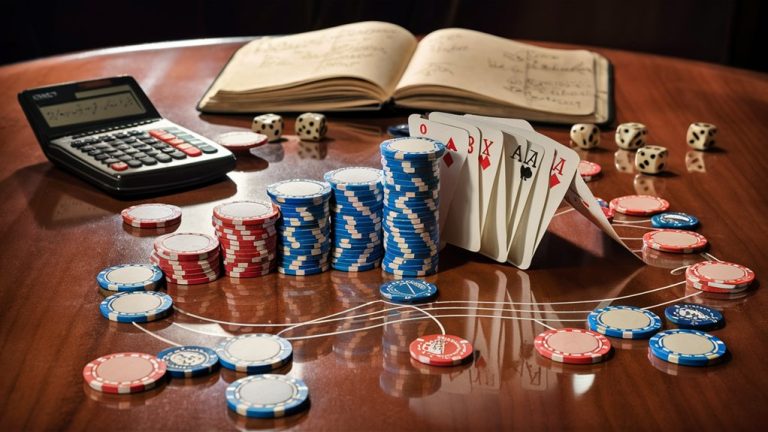
Winning at Poker: Key Steps to Top Game

Main Plans for Poker Top Play
To be good at poker, you must get good at five key parts that build a strong base. Knowing and using these main parts sets top players apart from just-for-fun ones.
Math Skills
Pot odds, equity math, and expected value are key for top poker play. Every choice at the table must fit these exact numbers, which helps players make money often.
Power of Place
Smart placing gives a big upper hand in poker. Top players use their spot at the table to know more, control pot size, and get an edge over others. Playing from a late spot is very good for those who know the ropes.
Reading Other Players
Sharpening your skills in reading others by watching bet patterns and body hints opens chances to win. Good players always pick up on these clues to make the best choices.
How You Handle Your Money
Good money control means sticking to bet limits and risk rules. Pro players keep a tight grip on their cash, making sure they can play a long time and make money well.
Keeping Calm
Being good mentally and avoiding tilt are key for ongoing wins. The best players keep their cool, making clear choices no matter what’s going on.
Each of these parts build on each other, making a strong plan for poker top play. Players must always make their skills better and adjust to new game ways and what other players do.
Knowing Poker Math
Knowing Poker Math: A Full Guide
Basic Math Ideas in Poker
Poker math is the base of smart choices at the poker table. Pro players use math rules to pick the best moves in any hand. Doing well in poker means knowing these key math plans and chance ideas.
Working Out Pot Odds and Equity
Pot odds show the must-know link between the cost to call and pot size right now. Players must weigh these odds against their hand equity – the chance of winning – to see if it’s worth calling. Getting this link right helps you make choices based on math, not just guesswork.
Deep Ideas: Implied Odds and Expected Value
Implied odds think about possible future bets, making it seem good to call with hands that don’t yet have the right odds. This smart move lets players get the most from strong hands and lose less with weak ones. Expected value (EV) is the full plan for making decisions in poker. By working out the math of each action, players can:
- Look at many possible results
- Balance chances with likely rewards
- Pick the money-making play in any case
Usable Poker Math
Good use of poker math needs:
- Regular odds work during play
- Knowing chance spreads
- Steady study of math ideas
- Using game theory well (GTO)
Knowing these math basics turns book-smarts into real table wins, leading to more cash-making choices.
Playing Well by Your Spot, and Table Ways
Being Top at Spot Use and Table Ways in Poker
Basics of Smart Spot Use
Your spot at the poker table gives a big game edge that smart players use all the time. Late spots let you see what others do before you act. Players who get this right play more kinds from later spots and keep it tight when they are up first.
Seeing and Using Table Flow
Table ways need you to always check how others play and change your plan to match. When you face bold players to your right, a holding back game with tight ranges is best. In quiet game times, up your boldness and take pots more often to make it worth your while.
Picking the Best Seat and Managing Your Stack
Picking seats by other players’ skill can make or break how much you win. Having bold players to your right and easy ones to your left sets you up to manage pots and make better choices. How deep your stack is changes how you should play – deeper stacks mean being careful, while short ones open up chances for bold moves and smart aggression.
Reading Your Opponents
Reading Your Opponents: Advanced Game Plan

Being Best at Guessing by Watching Others
Reading others right gives you the key edge between players who make money and those who just get by. While body hints tell you a lot, the best clues come from watching bet patterns, timing, and old habits. Winning means seeing how they change from usual ways.
Seeing Patterns and Smart Tagging
Not usual moves show you patterns in how others play. When bold players start playing safe, it often means they have the best cards or really bad ones. Watch for key things like how they handle pot size, how often they up the bet, and where they sit. These clues help make good guesses about their game plan. 여기서 안전성 확인하기
Using Bet Size to Guess
Looking at bet size is a top way to guess hand strength. Changes from normal bet size often shows how strong their hand is, with many players not knowing they bet big with so-so hands and small with super good ones. Putting together bet size clues with place knowing and stack depth helps you read better and make the best choice. Keep watching while dodging the trap of seeing only what you think will happen. Tips for Playing Poker Like a Pro
How You Handle Your Money
Top Money Plans for Poker Players
Must-have Cash Rules
Smart cash ways set the base for lasting poker wins. Pro players keep a needed minimum cash pile of 20-30 game buys for cash games and 50-100 for matches to handle ups and downs well. For $1/$2 cash games with $200 buys, keep a poker pile of $4,000-$6,000.
Smart Level Move Rules
Follow firm cash rules when moving between levels. Move up only when you have 30 buys for the next level, and drop down when you go below 20 buys. Match cash rules should keep you at no more than 5% of total money per game.
Risk Rules and Keeping Profit Safe
Track Sessions and Set Limits
Track your cash well and check how you do each month to keep winning long term. Set firm stop-loss limits at 10% of total cash per game time. Keep your poker money and day-to-day money apart.
Keeping Winnings Safe
When winning, protect your cash by taking some profit out while keeping the main money pile safe. This smart cash way keeps you safe during bad times and keeps your play money long-term strong at the tables.
Staying Strong Mentally
Being Best Mentally: Top Poker Tilt Plans
Top Need for Staying Cool in Poker Wins
Staying cool marks the line between players who make money and those who lose often. Keeping calm in both good and bad times is key for long-term table wins. When on tilt, players make bad moves that don’t follow the good plan, causing big money losses.
Proven Tilt Plans
Setting Firm Lines
Having firm stop-loss lines before each game time is key to stop tilt-caused losses. Use these lines no matter how you feel.
Smart Mind Plans
- Think math over latest scores
- Do deep breaths when mad
- Keep a detailed poker book to spot tilt causes and emotion swings
- Watch how you play after big losses
- Take set 15-minute breaks to clear your head
Building Long-time Strength
Seeing change as just part of poker helps build the strength you need. Taking bad luck and losing times as normal parts of the game strengthens how you decide. This mindset helps you keep playing strong, even in hard times. Smart mind ways end up making you more money in poker than just knowing how to play. By using these deep mind plans, players really boost their chance for long wins at the tables.
Top Poker Moves
Top Poker Moves: Mastering Smart Play
Thinking in Ranges and Checking Hands
Thinking in ranges moves from just usual poker plans to top game play. Rather than just guessing specific hands, top players think about all possible hands in making table calls. This full look lets for more on-point guesses and smarter moves.
Using Opponent Moves and Counter-Plans
Making moves on what you see is a strong way against easy-to-read foes. Seeing and using bet moves is key – up your bet three times against those who fold and keep bluffing low against those who always call. Smart change lets good players earn the most against different player kinds.
Moves by Your Spot and Bet Sizes
Where you sit really changes the best plan to pick. Being last to play lets for wider hand picks and bold bets to keep going, while being first means choosing tighter ranges and smart pot control. Top players change their bet sizes based on:
- How the game board looks
- How others tend to play
- How deep their cash pile is
- How the table plays
Keeping bets in check stops others from making good counter-moves while keeping your play hard to guess. Doing well needs lots of practice, quick changes as you play, and deep knowing of poker math and mind ways.


